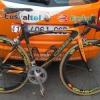I read online that
The effectiveness of most anticancer drugs depends upon interfering with the synthesis of new DNA material. It is now well known that there are certain times of day in which DNA synthesis is either high or low. In order to maximize the effectiveness of these drugs it makes sense to administer them at a time when the synthesis of genetic material is at its height, since you will then catch most of the cancer cells with their DNA unzipped, as it were
this is called chronobiology
http://www.ncbi.nlm....tractPlusDrugs1 Chronopharmacokinetics have been shown for several cardiovascular active drugs (propranolol, nifedipine, verapamil, enalapril, isosorbide-5-mononitrate, digoxin, etc.). Far more drugs were shown to display significant daily variations in their effects (chronopharmacodynamics, chronotoxicology) even after chronic application or constant infusion. In conclusion, there is clear evidence that the dose/concentration-response relationship of drugs can be significantly dependent on the time of day. Thus, circadian time has to be taken into account as an important variable influencing a drug's pharmacokinetics and/or its effects or side effects
do people have ideas about longevity supplement dosing times that are beneficial perhaps resveratrol has a chonobiologic aspect
I'm aware that we all like the idea of keeping blood levels of supplements high
Edited by treonsverdery, 14 February 2008 - 01:26 AM.












































